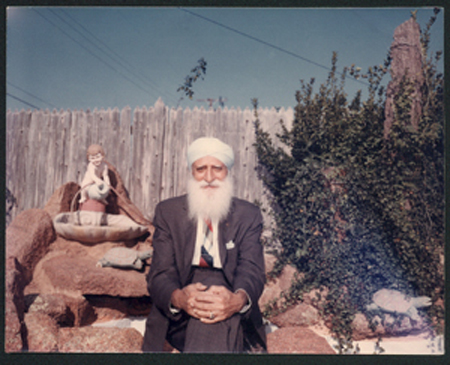
Various South Asian and Indian America groups recall Thind’s struggle to obtain US citizenship.
A number of South Asian and Indian American groups paid tributes to Bhagat Singh Thind on the 95th anniversary of the denial of citizenship to him and recalled his struggles to get the American citizenship.
Thind came to the United States from Punjab in 1913 to pursue higher education. Five years later, he joined the US Army and was granted US citizenship in the state of Washington. But the citizenship was canceled soon by the Immigration and Naturalization Service.
The South Asian American Digital Archive published a detailed article about Thind and the struggles he had to face in this country. He was verbally abused, put behind the bars and subjected to racial profiling during his fight for citizenship.
The Sikh Coalition posted a photo of Thind holding a gun in his arms on Facebook in remembrance of the first Sikh soldier in the US Army.
“On February 19, 1923, the United States Supreme Court denied Bhagat Singh Thind citizenship to the United States because of his race and ethnicity. Many years later Thind — the earliest known Sikh soldier in the U.S. Army — overcame racist laws to finally become a U.S. citizen,” the Sikh Coalition wrote.
“#OnthisDay Bhagat Singh Thind was denied US citizenship by the Supreme Court. He joined the U.S. Army, received citizenship in #Washington & had it revoked by Immigration & Naturalization Service. His case was heard by the Supreme Court in 1923,” tweeted Indiaspora Forum.
“Today is the anniversary of the day Bhagat Singh Thind was denied citizenship by the Supreme Court of the United…” wrote South Asian Bar Association of New York on Twitter.
Though he had received citizenship in 1919, the Immigration and Naturalization Service challenged the decision in the court and the case finally reached the Supreme Court.
The court ruled that Thind was not eligible for the citizenship since American citizenship was reserved for free white persons. The court’s decision was influenced by several factors including Thind’s involvement with Ghadar Party, which fought against the British in India, his appearance as a turban-wearing Indian and misconceptions about Indians that prevailed in the society during the time.
After the denial of citizenship, Thind traveled across the country giving spiritual and metaphysical lecturers. In 1942, he was arrested by two detectives under local laws preventing fortune telling.
During the hearing, he was asked to remove the turban that he wore as part of his belief. He was also verbally abused in the courtroom. After the hearing, he was sentenced to 90 days in jail. Later he was released from the prison after registering with the Omaha City Clerk as a minister of the Sikh faith.
Thind became a naturalized citizen through the Nye-Lea Act of 1935 that allowed granting citizenship to any veteran of the First World War regardless of their racial eligibility.
He continued his spiritual lectures traveling from city to city until his death in Los Angeles in September 1967.


